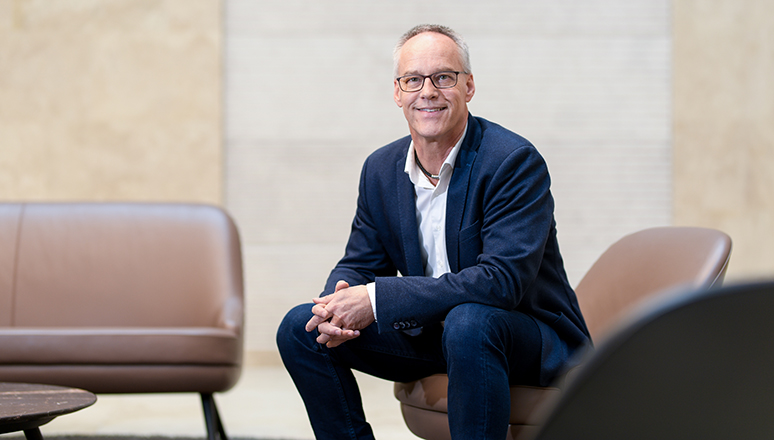A step towards the future of energy management
Aareal Meter is a solution that is paving the way for the energy management of tomorrow.

Matthias Tietz is not a typical banker. A tourism expert with many years of experience, he changed sector and now works in travel management at Aareal Bank, where he is responsible for planning and booking business trips. As well as efficiency, there is an increasing focus on sustainability.
Editor: Mr Tietz, when you joined the Bank's travel management team in late 2020, you already had a lot of experience in the travel business. Can you tell us briefly about the different jobs you've had?
Matthias Tietz: Even as a child, I was fascinated by other countries, cultures and languages. I trained with a travel company in the Sauerland. In 2000, I moved to Mainz. The city was looking for a travel partner for the "Great Wine Capitals" network, an international alliance of wine regions. I got to know wine regions all over the world and was able to improve my language skills.
Editor: What made you go and work for a bank after such a nice job?
Matthias Tietz: I noticed the job advertisement online in 2020. At that time, I only knew the name Aareal Bank from newspapers. After 40 years in tourism, I wanted to do something new professionally. I can still remember meeting colleagues from my team in my first video call. I had put on a tie and was very surprised at how informal it all was – not just in the purchasing department itself, but in dealings with my internal clients, too. That made my decision very easy.
Efficiency is particularly important when it comes to business trips
Matthias Tietz
Editor: So there wasn't a "clash of cultures". But there are definitely differences between a tourist and the colleagues you arrange trips for today, aren't there?
Matthias Tietz: The requirements are completely different. A tourist is looking for an experience and those little extras, and will sometimes haggle to get a few advantages. On a business trip, it's about no-nonsense efficiency: getting to your meeting quickly and in a relaxed state, finding a hotel where you can briefly unwind in between, then getting back, again with a minimum of fuss. The most important thing is not to waste any time, while avoiding unnecessary stress during travel. Digital solutions that we have integrated into our processes can help here.
Editor: So digitalised processes are a key theme for you, too. What other trends are you currently noticing in the business travel market?
Matthias Tietz: After restrictions on contact in the last few years due to the pandemic, business travel is now picking up again significantly. Aareal Bank's aim is to be close to its clients and markets, which includes contact in person at trade fairs or the clients' own premises. And when it comes to valuing a property that is to be financed, if we just look purely at the numbers, that's only one side of the story. It's still essential to get a first-hand impression on site and to talk to planners and operators in person.
Editor: To what extent has sustainability become an issue on these business trips?
Matthias Tietz: We have a travel policy to that effect, but each time I plan a trip I always ask: Do you have to fly, or can you make the journey quickly and conveniently by rail? What sustainability criteria does the hotel meet? Has the use of renewable energy sources made it largely self-sufficient in terms of its energy supply, for example?
Based on my many years of experience with hotels, airlines and train operators, I can then put together an optimum package. Even minor sustainability issues count – for example, if someone tells me after their trip that there weren't many disposable products in the hotel. We're always very grateful for that kind of feedback from colleagues.
From the start, I appreciated the mix of structured processes and open, active cooperation
Matthias Tietz
Editor: Your many years of experience will no doubt help you in this area of your work. But have there been any areas where you've had to learn something new or retrain?
Matthias Tietz: Regulation is ever-present in a bank, along with the associated duties in terms of documentation. But the nice thing is that we give each other a lot of support, even in these formal processes. You can approach anyone, and you'll always get a friendly response. I can't say whether that's been the case for 100 years – but colleagues who have been at the Bank for a long time have confirmed that they have always valued this open, "can-do" mentality at the Bank. And that's an important reason why I feel at home here, too. At any rate, I haven't needed my tie again since the job interview.